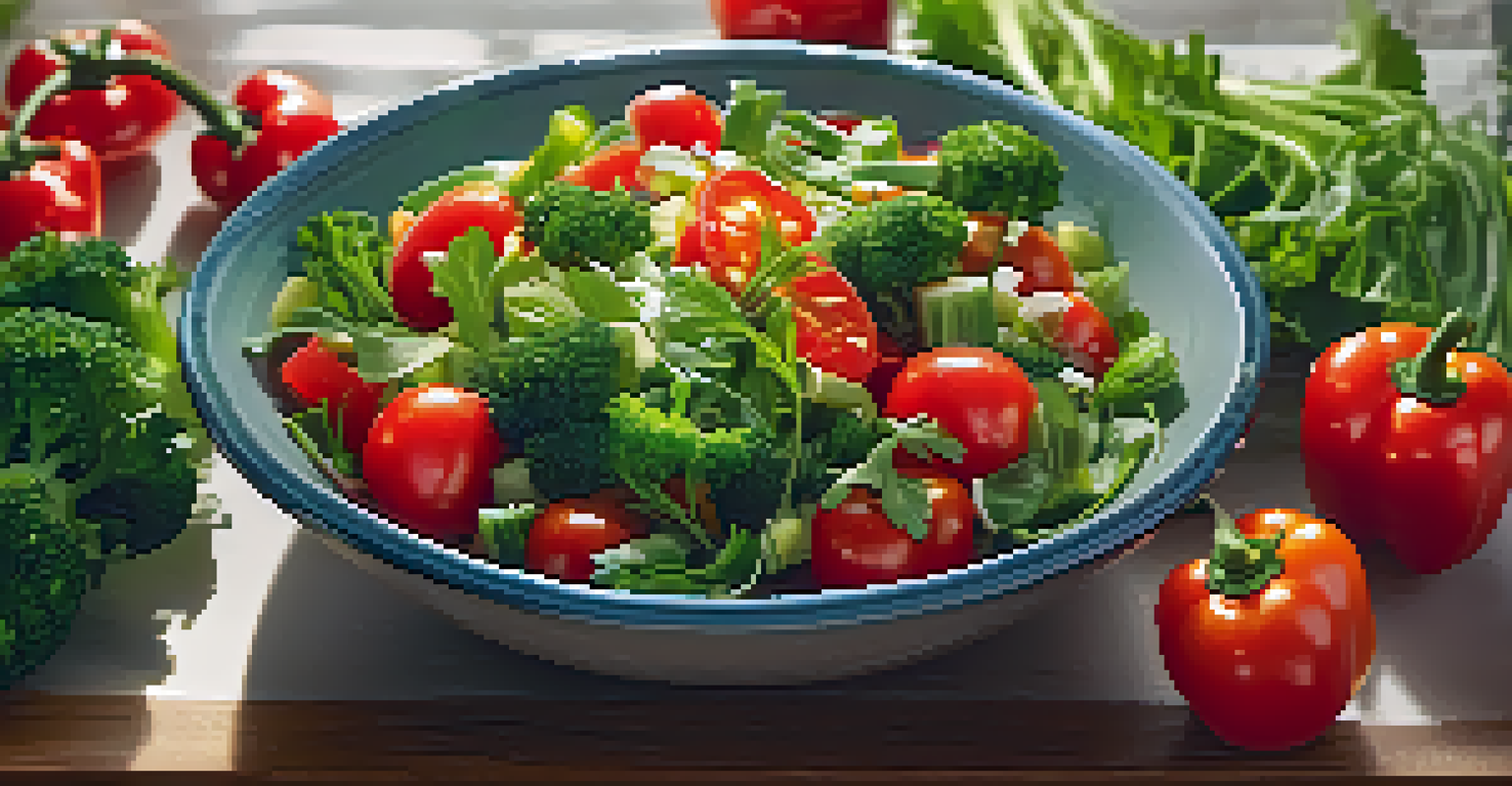Vitamin C-Rich Raw Foods for Optimal Immune System Support

Understanding Vitamin C and Its Benefits
Vitamin C, or ascorbic acid, is a vital nutrient that plays a significant role in supporting our immune system. It helps stimulate the production of white blood cells, which are essential for fighting off infections. Moreover, Vitamin C is a powerful antioxidant, protecting our cells from damage caused by free radicals.
The greatest wealth is health.
This nutrient also aids in the absorption of iron from plant-based foods, contributing to overall health. When we consume adequate amounts of Vitamin C, we're not just warding off colds and flu; we're also enhancing our body’s ability to heal. It’s truly a multitasker in the realm of nutrition!
Incorporating Vitamin C-rich foods into your diet can lead to a healthier immune response. As we explore raw foods rich in this essential vitamin, you’ll discover that nature offers an abundance of delicious and nutritious options.
Top Raw Fruits Packed with Vitamin C
Fruits are among the richest sources of Vitamin C, and many can be enjoyed raw for maximum benefits. Oranges and grapefruits are well-known for their Vitamin C content, but did you know that kiwifruit and strawberries are also excellent choices? A single kiwifruit can provide more Vitamin C than an orange!

Berries, such as strawberries, raspberries, and blackberries, are not only tasty but also loaded with antioxidants, making them perfect for your immune health. Eating a variety of these fruits can ensure you get a broad spectrum of benefits. Plus, they can easily be added to smoothies, salads, or eaten as a snack.
Vitamin C Boosts Immune Health
Vitamin C is essential for stimulating white blood cell production and protecting cells from damage, enhancing overall immune function.
Emphasizing these Vitamin C-rich fruits in your diet can transform your health. They’re not only refreshing and delicious but also offer a natural boost to your immune system.
Vegetables That Boost Vitamin C Levels
While fruits often steal the spotlight, many vegetables are also brimming with Vitamin C. Bell peppers, especially the red variety, are among the top contenders, boasting even more Vitamin C than citrus fruits. Adding raw bell pepper slices to your salads or enjoying them with hummus can elevate your nutrient intake.
Let food be thy medicine and medicine be thy food.
Broccoli, kale, and Brussels sprouts are other great options that can be eaten raw. These cruciferous vegetables are excellent for overall health and can be enjoyed in salads or as crunchy snacks. Their high fiber content also contributes to gut health, which is closely linked to immune function.
Incorporating a colorful variety of these vegetables into your meals can enhance both flavor and nutrition. It’s all about making your plate as vibrant as possible for optimal health benefits.
Herbs and Spices Rich in Vitamin C
Don’t overlook the power of herbs and spices when it comes to Vitamin C! Fresh herbs like parsley, cilantro, and thyme are not just flavor boosters; they are also packed with nutrients. For instance, just two tablespoons of fresh parsley can provide a significant amount of Vitamin C.
Spices such as chili peppers also contribute to your Vitamin C intake, and they can add a spicy kick to your dishes. Incorporating these fresh herbs and spices into your meals can enhance both the taste and nutritional profile of your food.
Diverse Sources of Vitamin C
Incorporating a variety of raw fruits, vegetables, and herbs into your diet can significantly increase your Vitamin C intake and overall nutrition.
Experimenting with different herbs and spices can keep your meals interesting while supporting your immune system. So go ahead and sprinkle some fresh herbs on your dishes!
How to Incorporate More Raw Foods in Your Diet
Transitioning to a diet rich in raw foods doesn’t have to be daunting. Start by adding raw fruits and vegetables to your breakfast routine—think smoothies filled with spinach and berries or a simple fruit salad. This way, you’re kicking off your day with a boost of Vitamin C.
Snack time is another great opportunity to include raw foods. Instead of reaching for processed snacks, try munching on raw bell pepper sticks, cherry tomatoes, or a handful of nuts. It’s an easy swap that can make a significant difference in your nutrient intake.
Lastly, consider meal prepping to make it easier to incorporate raw foods into your diet. Having ready-to-eat options on hand can encourage you to choose healthier snacks and meals throughout the week.
The Importance of Variety in Your Diet
When it comes to nutrition, variety is key. Different fruits and vegetables contain different combinations of vitamins and minerals, so eating a wide range ensures you’re getting the full spectrum of nutrients your body needs. This is especially true for Vitamin C, as various sources can provide different additional benefits.
Incorporating a rainbow of colors in your meals not only makes them visually appealing but also boosts their nutritional value. Each color often represents different phytochemicals that support health in unique ways, enhancing your immune system and overall well-being.
Lifestyle Affects Immunity Too
A holistic approach that includes a balanced diet, regular exercise, sufficient sleep, and stress management is crucial for optimal immune support.
So the next time you prepare a meal, think about how you can add a bit more color and variety. Your body will thank you for the diverse range of nutrients!
Lifestyle Tips for Optimal Immune Support
While a diet rich in Vitamin C is crucial for immune support, don’t forget that lifestyle factors play a significant role too. Regular exercise, for instance, can help boost your immune system by promoting good circulation and reducing stress. Aim for at least 30 minutes of moderate physical activity most days of the week.
Adequate sleep is another essential component. When you rest well, your body has the opportunity to repair and regenerate, which is vital for maintaining a strong immune system. Aim for 7-9 hours of quality sleep each night.

Lastly, managing stress through mindfulness practices, such as yoga or meditation, can also support your immune health. A holistic approach, combining nutrition and lifestyle habits, is the best way to maintain optimal immune function.